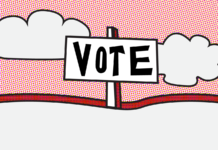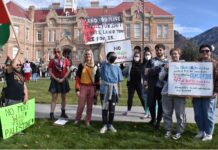
Sponsored in part by Salt Lake Community College’ s School of Humanities and Social Sciences, Dr. Tariq Ramadan kicked off 24 days dedicated to the exploration of “Pathways to Peace” on March 20, 2013.
Ramadan, a professor of Contemporary Islamic Studies at Oxford University, spoke at the Salt Lake City Public Library about Islam, human rights and the Arab Spring.
“This is not a political revolution, yet,” said Ramadan. “It’s going to be a long process.”
Ramadan believes that the term “spring” was used too quickly to describe the actions that took place across Northern Africa.
What the demonstrations did show was that people could do something against a dictator, and they could do so in a nonviolent and disciplined fashion.
“We all agree that we don’t want him, and that’s it,” said Ramadan. However, “the strength of being united against is not enough.”
For a lasting change, the people must be united for a project of some sort, or else the strength of before becomes weakness after
“If you look at the whole region, it’s unsettled, and no one can say what is going to happen,” said Ramadan.
Economic stability is something that needs to be addressed for the people in the Middle East before peace can be considered.
“If you are serious about human rights, you need to deal with economic stability,” said Ramadan. “We must tackle it in economic terms.”
For democracy to take hold, people must have food and education
Ramadan said that food is the first human right. Food represents the right to choose and is about poverty.
“If poverty is huge, then democracy is weak if not absent,” said Ramadan. “Beyond poverty is to be educated.”
In order for democracy to work, the people need to be educated. For women, education is important for their liberation.
“When you have education and can access the job market, you are empowered,” said Ramadan. This also means that you should get the same pay for the same skills regardless of gender.
Currently, the countries have a “very fragile political situation” and are a “very, very profitable economic investment” for transnational corporations, especially those involved in fossil fuels.
The Israel-Palestine conflict is another situation that needs to be addressed
“The stability of the region has to do with this conflict,” said Ramadan. “We have nice words, but no real policy on the ground.”
Ramadan said that the Arab world lacks creativity and imagination; this leads to western culture domination and a marginalization of those who are of Arabic culture.
“To celebrate the culture is something important,” said Ramadan. “It nurtures in you a sense of well-being and belonging.”
Other sponsors of Pathways to Peace include Peaceful Uprising, Westminster College and Gandhi Alliance for Peace.
Speakers include Dr. David Vine from American University, Phyllis Bennis from the New Internationalism Project at the Institute for Policy Studies and Jamila Raqib from the Albert Einstein Institution.



